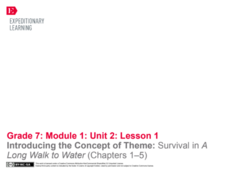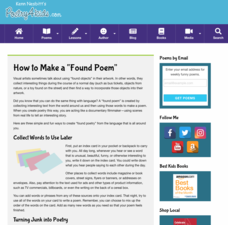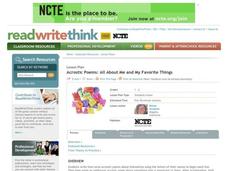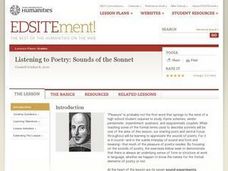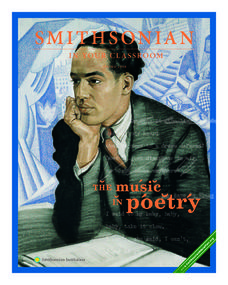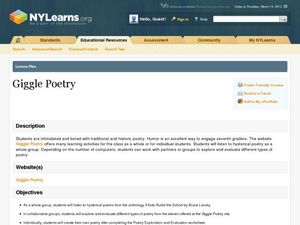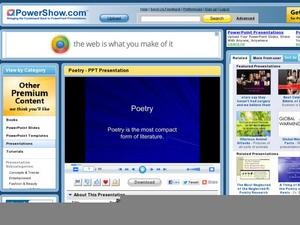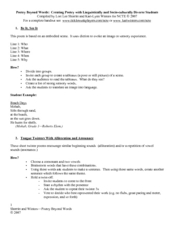Curated OER
1900 America: Primary Sources and Epic Poetry
Using Walt Whitman's Song of Myself and Hart Crane's The Bridge as models, class groups first craft their own epic poems for 1900 and, using primary sources, create a multi-media presentation that captures the sights and sounds of life...
Curated OER
Everyone Can Write Poetry
Embark on a journey of writing several different types of poetry. Fifth graders read several examples, and use the examples to model their own writing. Each poem is to be accompanied by a different art visual representation. In the end,...
Curated OER
Spring into Poetry
How many different types of poetry are there? Let me count them; list poems, haiku, and makes-me-think poems are only a few. Learners create their own poems accompanied by artistic projects such as haiku poems written on kites.
National Center for Families Learning
The Summer Fun Summer Learning Poetry Unit
Focus on poetry this summer to enhance those comprehension, fluency, and language skills with a set of resources intended to explore different types of poetry, specifically lyric poetry. The daily activities contain differentiation ideas...
EngageNY
Launching the Performance Task: Planning the Two-Voice Poem
Two voices, one poem. Scholars learn about and write a two-voice poem using graphic organizers, model poems, and guides. They practice reading poems with a partner and discuss how a poem of this type could help compare Salva and Nya in A...
Anti-Defamation League
Social Justice Poetry
Learners gain insight into how songs and poems express feelings of injustice. They also learn about literary devices and types of poems and make a personal connection when they write their own free verse poems about injustice.
Poetry4kids
How to Write Funny Poetry — Chapter 1: Writing Poetry
Do you wish you could write poetry that makes people laugh? Now you can! Check out the first chapter in a poetry writing series that emphasizes the importance of connecting subject matter to a light, bouncy meter.
PBS
Exploring Selected Haiku by Issa
If your class doesn't know what a haiku is, show them two examples from the Japanese poet Issa (both included here), and have them make some observations. How long are they? What is the structure? A video and a list of questions help...
Poetry4kids
How to Create a “Found Poem”
Writers compose an original found poem by searching for words that inspire them. Words are taken from everyday conversation, books, cut from magazines, the mail, or an already written poem.
National Council of Teachers of English
Acrostic Poems: All About Me and My Favorite Things
Budding poets create two acrostic poems, one for their name and another using a word of their choice. Over the course of five days, scholars compose, revise, publish, and share their work with their peers.
Curated OER
Listening to Poetry: Sounds of the Sonnet
Learners investigate how sound influences meaning in poetry by listening to sonnets. They write an analysis after listening to and reading sonnets.
Columbus City Schools
Poetry Speaking and Listening Standards
Celebrate April's National Poetry Month or enrich a poetry unit with a wealth of language arts material. Class members develop an oral interpretation of a poem and/or develop a podcast interview with a poet.
Poetry4kids
Rhythm in Poetry: Okie Dokie, Here’s the Trochee
Iambs and trochees may seem intimidating to some learners, but after reading a straightforward online lesson, they'll be masters of poetic feet! The lesson includes examples of trochaic poems from Edgar Allen Poe and William Blake.
Curated OER
Poetry
Explore the semantics of poetry with this higher-level presentation. With examples from Dickinson, Frost, and Dr. Seuss, the slides clearly explain the details of poetic structure, license, and schemes. You could use this in a language...
Smithsonian Institution
Smithsonian In Your Classroom: The Music in Poetry
Take poetry off the page and put it into terms of movement, physical space and, finally, music with this series of three lessons from the Smithsonian Institution. This resource introduces students to two poetic forms that originated as...
Curated OER
Giggle Poetry
Poetry can be fun! To set your pupils giggling, have them listen to poems from If Kids Ruled the School by Bruce Lansky. Then, they can study the different types of poetry on www.gigglepoetry.com, and choose one form on which to base...
Curated OER
Poetry: The Most Compact Form of Literature
Introducing or need to review literary devices and terms for a study of poetry? Though text heavy, the explanations and examples of key poetic devices will provide learners with the vocabulary they need to discuss and craft poems.
Curated OER
Personal Poetry Books
Students work in the classroom and in the computer lab to produce a Personal Poetry Book.
Curated OER
Acrostic Book Report
Young scholars read the story Wild Horse Winter and construct acrostic poems. In this poetry lesson, students use adjectives and events in the text to develop an acrostic poem.
Curated OER
Poetry Beyond Words: Creating Poetry with Linguistically Diverse Students
Models of and directions for how to write 20 different types of poems are featured in an NCTE resource. The introduction to each form highlights the embedded concepts. For example, tongue twisters encourage poets to use alliteration and...
Curated OER
Ocean Life Poetry: Limericks & Cinquain Poems
Young oceanographers conduct independent online research to learn about ocean life, explore limerick and cinquain poem structure and syllabication, and produce poetry that conveys the information they found. Links don't work, but it's...
Tech Coach Corner
Poetry: It's Rhyme Time!
Define poetic devices and provide examples. The slides list information for rhyme, repetition, alliteration, simile, metaphor, free verse poetry, onomatopoeia, and patterned poetry. The animation and sounds are a bit distracting, and...
Curated OER
My Winter Acrostic
Students create an acrostic poem about winter. In this lesson about acrostic poems, students explore acrostic poetry. Students read an acrostic poem as an example. As a class, students come up with an acrostic poem for the word "CLASS"....
Curated OER
Animal Poems
Students create their own acrostic poems. In this poetry lesson, students read poetry book to view examples of acrostic poems. Students then write an acrostic poem using their name.
Other popular searches
- Types Lyric Poetry
- Types of Poetry
- Types of Poetry Powerpoint
- Types Lyrical Poetry
- Different Types of Poetry
- 6 Types Lyric Poetry
- Identify Types of Poetry
- Word Search Types of Poetry
- Different Poetry Types
- Types Poetry Word Search
- Word Search: Types of Poetry
- Poetry Types Worksheet






